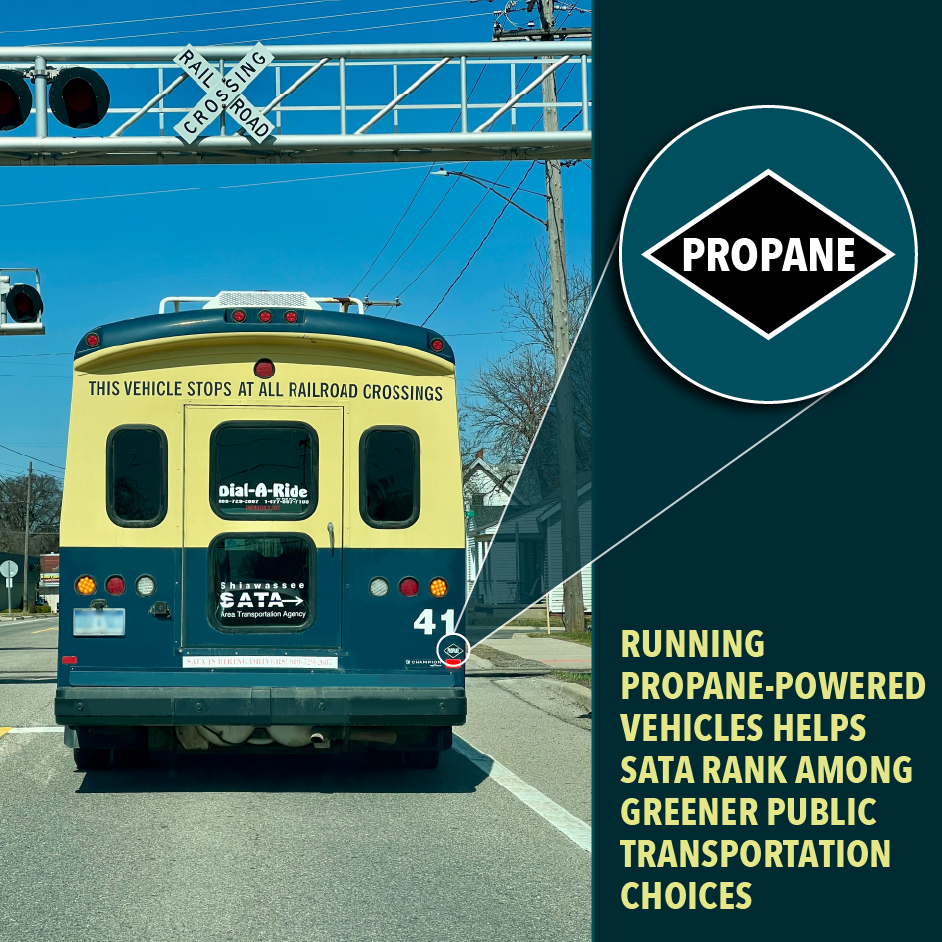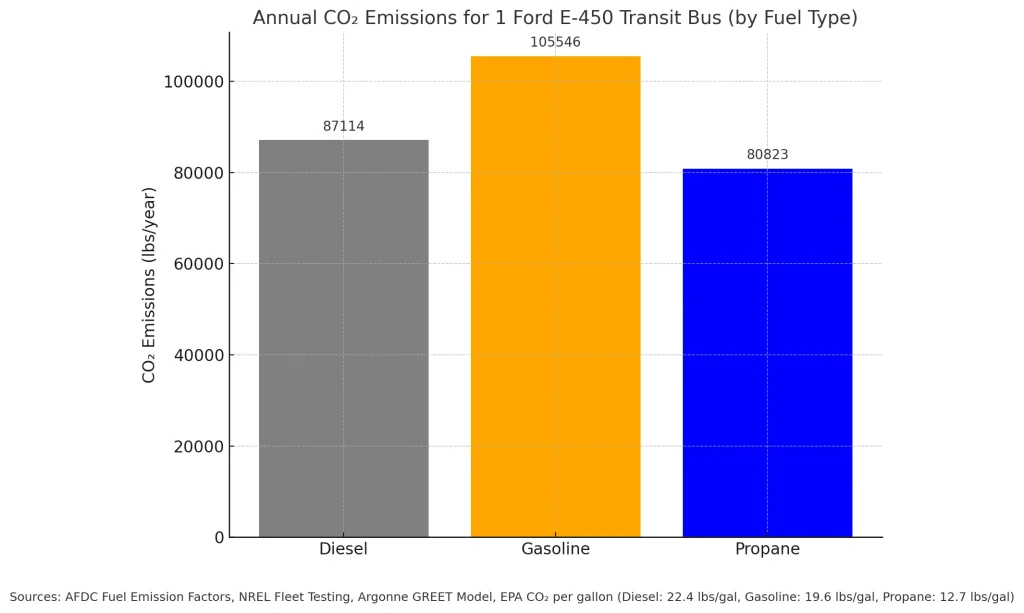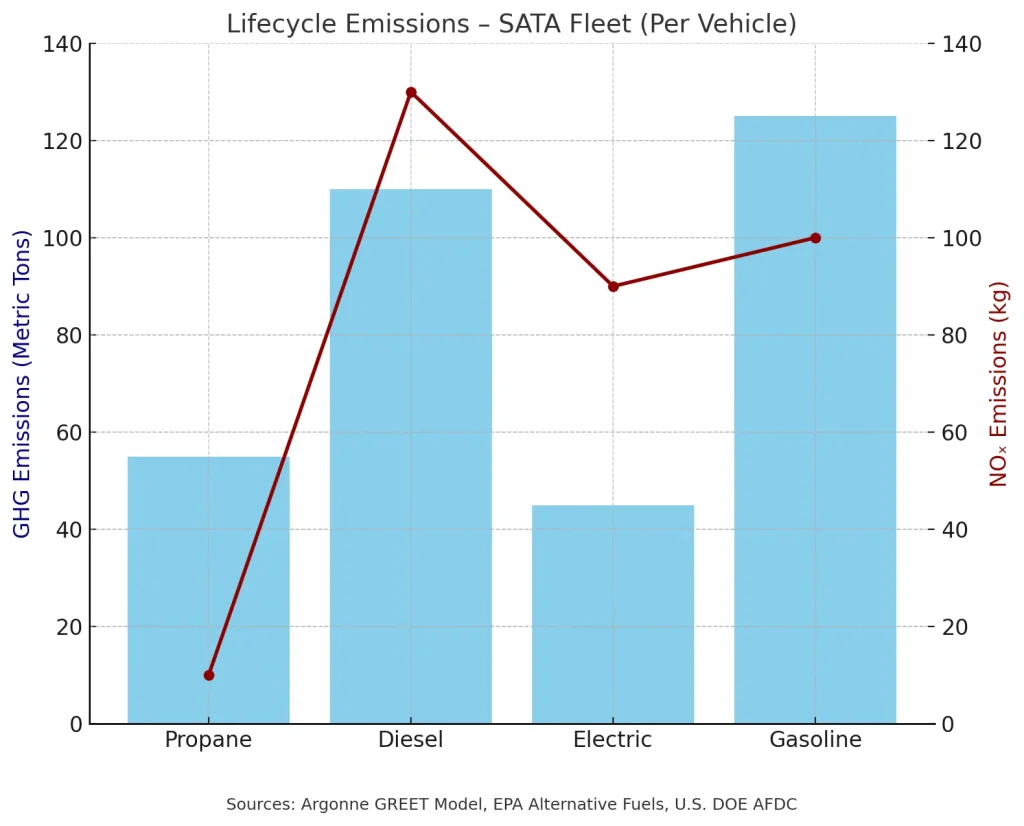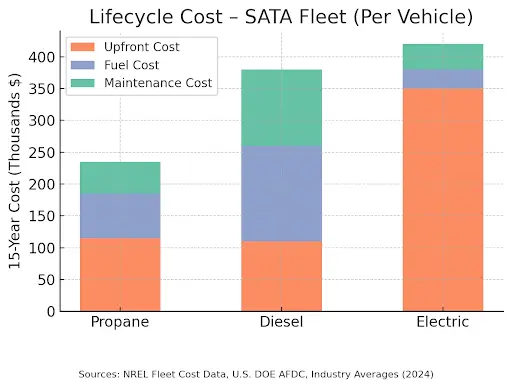Shiawasee Area Transportation Agency Cuts Costs, Emissions with Propane-Powered Fleet Vehicles


SATA Runs on Propane
Propane Transit Buses in Fleet: 9
Savings: Lower Fuel Costs
CO2 emissions – annual reduction 483,000 pounds CO2
The Shiawassee Area Transportation Agency (SATA), operating out of Owosso, Mich., took a proactive step toward a more cost- and emission-efficient transit fleet operation by using propane-powered vehicles. SATA began using propane in early 2000. In 2024, they received $6,000 from the Michigan Propane Gas Association to help purchase four new propane-powered transit buses. SATA now operates nine propane buses—half its fleet—helping to keep rides affordable, reliable, and more environmentally friendly throughout the greater Shiawassee County area.
Proven Economic and Environmental Benefits
Propane is a low-carbon, nontoxic alternative fuel and does not contaminate the air, soil, or groundwater (EPA). It’s the world’s third most common transportation fuel, behind gasoline and diesel, and is considered an alternative fuel under the Energy Policy Act of 1992. Propane fuel is considered “low-emission,” emitting significantly fewer greenhouse gases and harmful pollutants than gasoline and diesel vehicles.
When comparing SATA’s fleet size–9 propane transit buses to 9 gasoline transit buses–they’ve saved 483,000 pounds of CO₂ emissions annually, equivalent to canceling out the energy use of a high school football stadium (lights, locker rooms, concessions) for over 20 seasons.
Financially, propane costs less per gallon than diesel and gasoline. Propane also reduces engine wear due to its low-carbon combustion. By running a clean fuel through the engine, there are fewer maintenance expenses, fewer service disruptions, and increased resources available for rider services and community investment. Additionally, there is no need for extra fuel additives or block heaters in the winter, reducing maintenance costs.
A Safe Fuel
Over 20 transit agencies use propane fleets to transport their local residents, comprising the 30,000+ propane-powered vehicles on the roads in Michigan.
Both fleet drivers and passengers prefer propane-powered transit vehicles for several reasons. For instance, propane provides a remarkably quiet ride, enabling greater communication between drivers and passengers. Using propane doesn’t require PPE or Personal Protective Equipment to fill a propane fuel tank when using the Type K15 or Euro style nozzle at the pump.
Fuel tanks on propane vehicles are 20 times more puncture-resistant than those on gasoline and diesel units. They are made from carbon steel, in accordance with the American Society of Mechanical Engineers, ensuring transportation durability and reliability.
Additionally, every onsite propane fueling station is equipped with a lock-off valve that automatically stops the flow of propane if a pressure drop is detected anywhere in the system, providing an extra layer of safety for transit fleets.
Easy Infrastructure
Most transit agencies contact their local propane company to procure a propane contract, like The Rapid, and have a propane storage tank installed on-site. However, there are other fueling options available to transit agencies, such as public fueling stations that SATA uses at 1011 Corunna Ave, Owosso, MI 48867. At this facility, it is shared with the Shiawasee County Regional Education Service District, which runs its propane school buses. SATA bus drivers pull up to the station at any time of the day and are able to fuel their buses. There are propane fueling options and estimated costs on: MIAutogas.com
$6,000 Available from the Michigan Propane Gas Association
The Michigan Propane Gas Association includes propane fleet vehicle experts who can answer your transportation questions and to help make a transition to propane smooth for your district. The MPGA also funds its propane fleet rebate, up to $6,000, to those new to propane.



